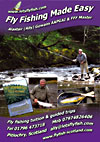When knotting any monfiliment material such as nylon or
flurocarbon ensure that it is lubricated before easing the knot tight
by pushing and pulling the mono together. Always try to avoid any distortion
or "pig tailing" of the material because that makes it weak.
Never use old nylon mono, especially if it has been exposed to sunlight
because it will have deteriorated and there is no point in loosing a fish
and a fly for the sake of a few cents worth. All knots can be further
secured by glueing with a suitable waterproof glue. I recommend glueing
knots joining leaders to lines such as the nail knot and the borger knot.
There are hundreds of fishing knots so if your favourite is missing and
you would like it included let me know the details and it will be added.
Details of the knots are contained in the downloadable brochure. Video showing how to tie almost all fishing knots is available on VideoFishingKnots.com.
Click on any knot to see a large picture of it and descriptions
of its uses
| Albright Knot is an excellent
and reliable method for attaching fly line to backing. |
 |
Nail knot is ideal for attaching a length
of mono to a fly line |
 |
Borger Knot is an ingenious method of tying
a nail knot without a nail! |
 |
| Water or surgeons knot for joining leader
materials. Best if the daimeters are reasonably similar. |
 |
Single Turle knot is ideal for attaching small flies
to the tippet. |
 |
Overhand loop is the easiest way to make a loop but
it is not the best! |
 |
| Grinner knot is good for joining leader
materials of any diameter. |
 |
Double Turle is the perfect knot for all salmon or
steelhead up or down eyed flies. |
 |
Perfection Loop is the best loop knot because it stays
pretty straight. |
 |
| Blood knot for joining leader materials.
Best if the diameters are reasonably similar. |
 |
Rapala knot is for tying a fly or lure with a slack
loop so that it can move without constraint. |
 |
Figure of eight provides a method of tying a fly line
direct to a loop. Very useful for silk lines. |
 |
| Fishermans knot is not suitable for monfiliment
but is useful for splicing fly lines if bound over afterwards. |
 |
The Half Blood knot or Clinch Knot is the simplist
method of attaching a fly or lure. |
 |
The loop to loop method of interlinking two loops is
a very common method of joining lines and leaders. |
 |
 |
 |
 |
 |
 |
 |
















